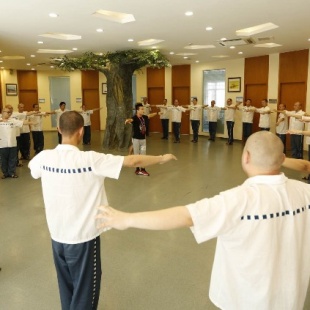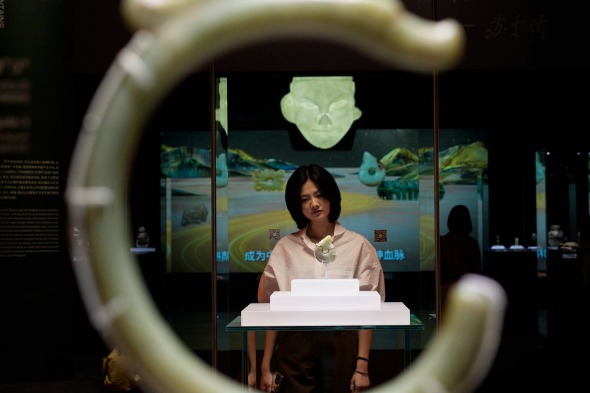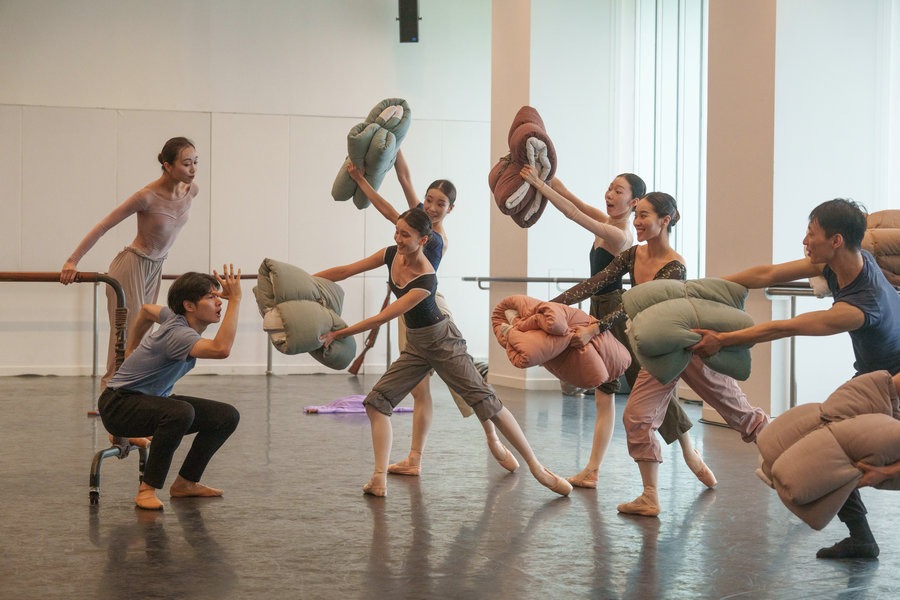Theater graduate helps prison inmates stage a comeback


Locked behind bars and struggling from a mess of emotions, Wang Li says the only thing that was plentiful to him was time, and he did not know how to use it.
The 30-year-old Jiangsu province native was serving a prison term of three years and four months in a Shanghai prison after he was convicted of an economic crime in 2017, and the ruling hit him hard.
"I simply could not put my past behind me. I would use all my time to recall memories and try to put things into perspective. I could not come to terms with my reality," he recalled.
It was a theater workshop, organized by Zhang Xiaoye, who is now a criminologist at East China University of Political Science and Law in Shanghai, which offered him some much needed detachment.
"I am a fan of movies and history. And participating in a play enabled me to see things from a different perspective and to put myself in the shoes of others," he says.
Involving inmates in theater performance can be one of the best ways to help them confront their darkest emotions and prepare for a return to life outside prison, according to Zhang, who has hosted two workshops on Western theater for inmates in two separate prisons in recent years.
She describes the programs as "icebreaking", as they require a lot of knocking on doors of prison authorities, just to get behind the high walls and barbed wire for an opportunity to elaborate on the potential benefits of rehabilitation through the arts.
"There was no official procedure I could resort to. I had to use every possible means, including personal relationships, to convince people that the thing I do is meaningful," she explains.
In the West, prison arts programs have become commonplace, with some countries even allocating state funding to help finance programs that prepare incarcerated individuals for their return to civilian life.
Zhang was inspired to conduct similar programs in China when she was pursuing a master's degree on applied theater at Goldsmiths, University of London in 2013. "It was so intriguing to me that I decided to choose it as the subject for my postgraduate dissertation," she says.
She made up her mind to return to China and start knocking on the doors of Chinese prisons as part of the study, before she was eventually, thanks to the help of some friends, able to establish contact with one prison in Beijing.
"I was allowed to enter the zone prepared for prisoners who were about to be released, and the officers were hoping that I could help them explore transitioning techniques that would prepare the inmates for their return to society," she recalls.
As soon as she walked into a room to see 15 inmates sat in perfect order, dressed in the same clothing, wearing the same hairstyle and expression, Zhang realized it would be a daunting challenge to introduce the basics of Western theater during her first visit.
"Their faces looked numb and lifeless, and I could hardly distinguish one from another. They even repeated the same lines to introduce themselves. It was like a series of habits that have been formed over the course of years," she says.
To break the ice and relax the inmates by easing their nerves, Zhang divided them into three groups and had them participate in some interactive games.
Next, she encouraged them to share their experiences and use their imagination to create a story, with the most dramatic being selected and adapted as a short play.
Eventually, one script, which told the story of a former inmate that returned to jail for attacking his employer after being wrongly accused of stealing money, was selected as the play for the inmates to perform.
However, perhaps unsurprisingly, the prisoners were reluctant to put on a show for the other inmates for fear of being mocked, and Zhang could only compromise and agree to the show being staged without an audience.
The anticlimactic ending of the first program, which lasted for about a month, did not discourage her from continuing with her exploration of rehabilitating inmates through theater.
In July 2016, Zhang joined a program that was initiated by Wen Xiaowei, a drama actor who opened a theater workshop for inmates at a prison in Shanghai after being incarcerated there for eight months.
"This time I was more involved as a researcher, and tried to observe how outsiders from society can interact with the inmates and the officers," she says.
The workshop included 20 prisoners, a majority of whom had only received an education to junior high school level or below. They started by engaging them in basic interactive games before progressing to performance activities, such as imitating animals.
They encouraged the inmates to interview their fellow prisoners to collect materials for plays, but only two of the inmates delivered.
"Most of the group explained that nobody would tell them the truth anyway, so they considered doing interviews to be meaningless," Zhang says.
Zhang says while prison art workshops can benefit the rehabilitation of inmates, the judicial system as a whole is, to a larger degree, shaping the process for the inmates' return to society.
She explains that prisons have their own systems of offering reward and punishment, such as in the form of credits the inmates can accumulate, to help reshape the behavior of the prisoners.
Some prisons also run their own theater-based programs, to facilitate the rehabilitation process of inmates, she says.
Despite the mixed success from her workshops, Zhang takes pride in the fact that some of the participants from her workshop did draw inspiration from it.
After his release from prison, Wang devoted himself to showing films in cafeterias and bookstores and moderating movie discussions in online communities.
"I became a better listener, and I also learned the importance of self-reflection and talking with the important people in my life," he says.
As for Zhang, she says that she will continue to explore opportunities to get involved with art workshops in prisons, even though the COVID-19 pandemic has made it virtually impossible to visit correctional facilities.
"The answers to the problems inside prisons lie outside. Art workshops are helpful at times, because they pay attention to the need of each individual and try to help them grow as people," she says.





































